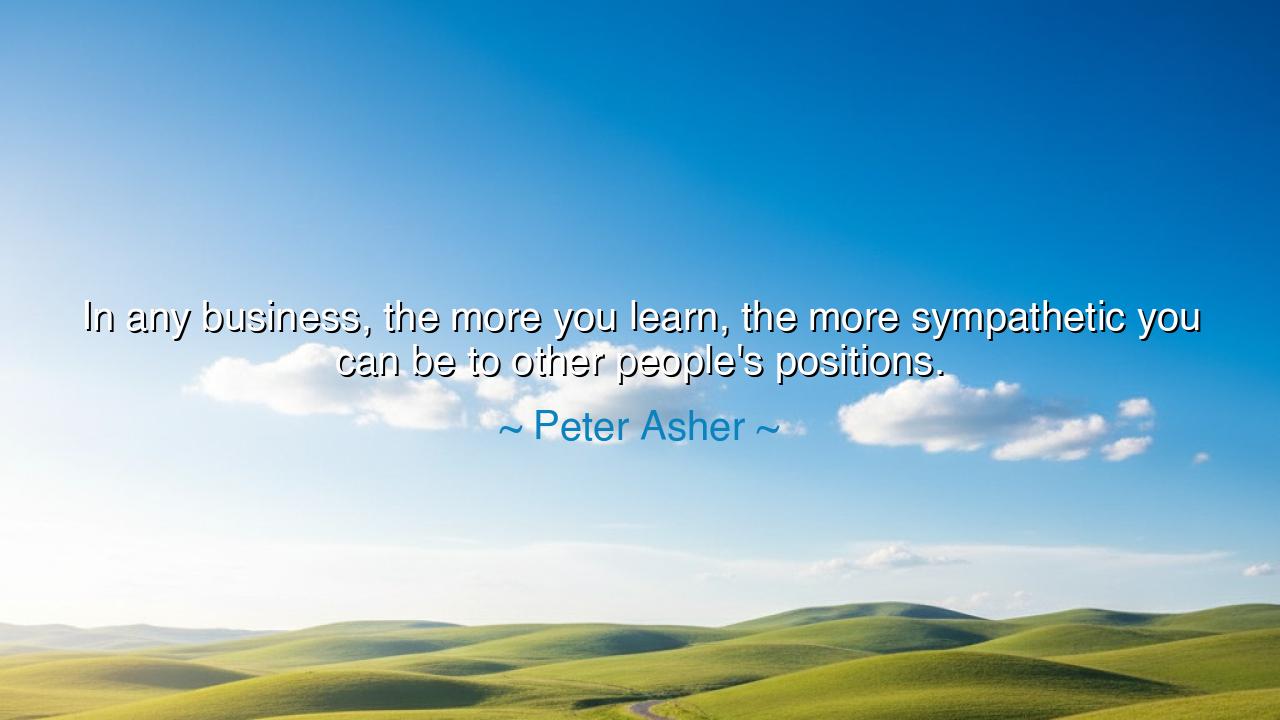
In any business, the more you learn, the more sympathetic you
In any business, the more you learn, the more sympathetic you can be to other people's positions.






Peter Asher, musician, producer, and man of many crafts, once declared: “In any business, the more you learn, the more sympathetic you can be to other people’s positions.” His words, though simple, are a map for the soul in the world of labor, trade, and creation. For knowledge is not only power, as many have claimed, but also understanding; and understanding is the root of compassion. When one knows only their own corner of the field, one judges harshly. But when one has walked in many shoes, the heart becomes tender, the mind more patient, the spirit more generous.
The ancients themselves proclaimed this. In the councils of Rome, the wisest senators were those who had known war, law, and toil, and thus could judge with balance. In Greece, Solon was revered because he did not rule from ignorance, but had traveled, listened, and studied the lives of rich and poor alike. They knew, as Asher tells us, that the broader the mind, the deeper the sympathy, for wisdom lies not in narrow mastery but in wide understanding.
History gives us shining examples of this truth. Consider Abraham Lincoln, who as a young man split rails, worked as a clerk, argued as a lawyer, and then governed as president. Because he had known the lives of farmers, laborers, and scholars alike, he could enter into the positions of others with remarkable grace. When he spoke of binding up the nation’s wounds after the Civil War, it was not only rhetoric but the fruit of long experience — the learning of many lives lived within one. His greatness lay not only in strength, but in his deep sympathy.
In the world of art and trade, too, this law holds. The master craftsman who has once been an apprentice treats apprentices with patience. The commander who has once been a soldier does not drive his men beyond what flesh can endure. The producer who has once been a performer — as Peter Asher himself — understands the anxieties and vulnerabilities of those who step on stage. Knowledge thus breeds not arrogance, but humility; not scorn, but compassion.
Yet the opposite is also true. Where learning is shallow, judgment is harsh. Those who know only their own tasks imagine others to be lazy or weak. The merchant curses the laborer, the laborer resents the merchant, each blind to the burdens of the other. Such blindness breeds division, and division breeds conflict. Asher’s words are therefore also a warning: ignorance narrows the heart, but knowledge widens it, until one can see not enemies, but fellow travelers bearing different loads.
The lesson is this: if you would lead, first learn; if you would judge, first understand. In every business, in every human enterprise, seek not only mastery of your craft, but knowledge of the crafts around you. Walk among your colleagues, listen to their struggles, learn their language. For the more you know of their positions, the more you will temper your demands, the more you will build harmony, and the more your work will endure.
So remember, O children of wisdom: the path to greatness is not paved only with skill, but with sympathy. Learn widely, and your heart will grow deep. Know the burdens of others, and you will walk beside them as a true companion, not a tyrant. For in the end, every business, every nation, every human bond flourishes not through conquest or command, but through the understanding that comes when knowledge and compassion walk hand in hand.






AAdministratorAdministrator
Welcome, honored guests. Please leave a comment, we will respond soon